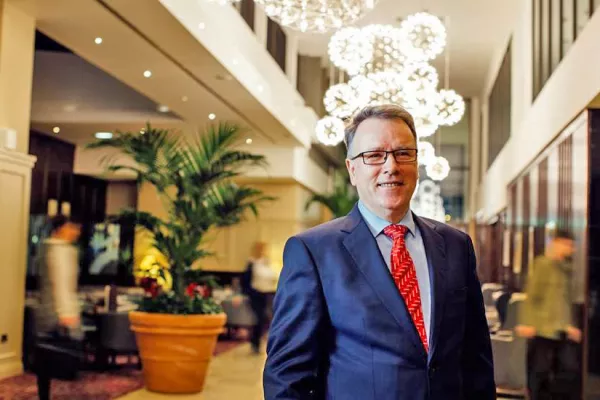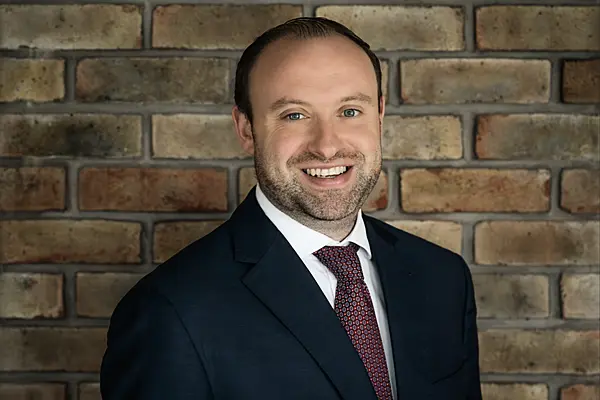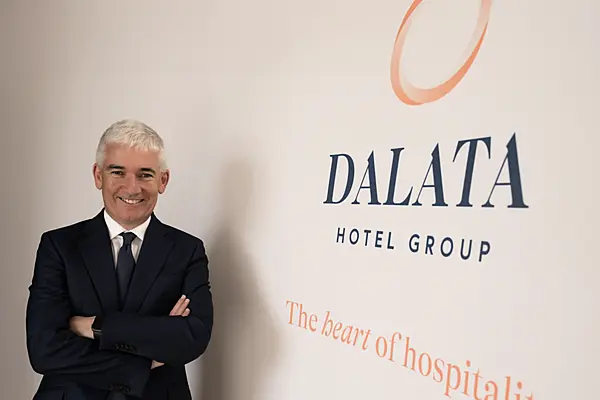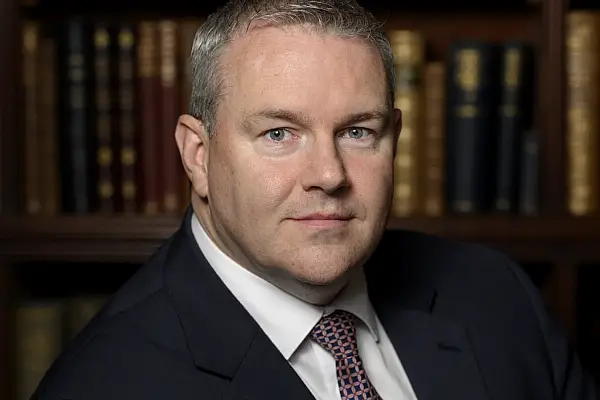For nearly 15 years now, Pat McCann has been almost synonymous with the Dalata Hotel Group, which he founded in 2007. The group was listed on the Dublin and London stock exchanges in 2014, and it is now the largest hotel group ever to exist in Ireland. For Pat, who announced his retirement as CEO in March, it’s a moment to take stock and look ahead.
This article was originally published in the Spring 2021 issue of Hospitality Ireland Magazine, in April of 2021.
Apparently, Pat McCann will soon be 70. You’d never know it to look at him, still less to talk to him. The day we speak – the day after he received his first vaccination for COVID-19 – he is as full of energy and optimism as ever. It seems hard to believe that he’s planning on retiring.
“I’ve been 52 years working, without a day unemployed,” Pat says. “I suppose, pre-COVID, I was beginning to consider what I might or might not do, and – obviously, with COVID – I had to delay any plans that I had.”
He describes the “lack of control over my own life” as CEO.
“When you’re the CEO, you think surely you call the shots, but, actually, you don’t. I am driven by events. Events drive my timetable, whether it’s investor relations, or banking, or tour operators – it’s always somebody else driving my agenda. When I looked at my diary for 2020 – pre-COVID – virtually everything in there was put in by somebody else. It wasn’t me. As CEO, you are kind of a facilitator in the whole process, so I said to myself, ‘You know what? I need to get a little bit more control,’ so while I’m retiring from Dalata, I’m not retiring from work.”
I figured he wouldn’t be, I say. So, how has the last year been – the Dalata-COVID experience?
“I’ve gone through some terrible crises in my 52 years,” Pat says, “starting with the oil crisis in the early 1970s – that was my first – and roughly about every ten years since, we’ve had a crisis, whether it was the big recession in the early eighties, the Gulf War in the early nineties, the dotcom bubble in the early 2000s, or 9/11. Then you had the financial crisis, but if you put all of those together, they wouldn’t make up a fraction of what we experienced in the last 12 to 14 months.”
As far as context goes, that’s pretty concise.
“If you look at the sector, it pretty much shut down,” he continues, “and for a very extended period of time. That’s never happened before, in this sense. The indigenous businesses in Ireland have been the hardest hit. Thankfully, we have the strength of the multinationals that have kept going in sectors like med-tech, pharma-chem, digital – all of those were in demand, and their businesses kept going quite well. People are surprised by the fact that Ireland’s GDP grew in 2020, but when you look at the structure of our economy, I wasn’t surprised at all. What we need now is to get the domestic economy back up and running.”
“[As far as Dalata is concerned] back in early March 2020, I was actually in the US on an investor run, and I decided to abandon it and come home early because things were beginning to look serious in Italy. Right then, we decided in Dalata to do three things, and we said, ‘If we do these three things well, we will come out of this reasonably well. If we fail on any of them, we’re not going to come out of it well at all.’
“The first thing was our people, and we made a decision that we would keep all our senior teams in place, right throughout the pandemic. If I look at today, we have 96% of our senior team still with us, which is phenomenal. So, we’re not out there trying to rebuild a team and rebuild the business at the same time – because that’s going to test a lot of businesses, where they let their people go and now they’re out looking, and they want to rebuild their teams and then rebuild a business. That’s no easy task. We have all our senior teams, both at central office and throughout each hotel.
“The other thing that we did was to make sure we had lots of engagement with our people – and we did lots of innovative things around engagement – and we are lucky that we have good technologies that allow us to do that. Also, we have our Dalata Academy, which carries out training and development of all our people – because, as you know, we grow our own people – and so all the teams that manage the new hotels, we grow them internally in the business. You cannot come into Dalata directly as a hotel general manager. You have to move back, and then, if you’re good enough, you move up. It was important, in many ways, that we had, and still maintain, that structure, and what we did was, for all our other people, we offered them various training and development programmes throughout the business. It didn’t matter what job you were doing in the company – a lot of these programmes were available to you.”
The response was enthusiastic.
“In 2020, our people took 92,612 courses online during the year. That means two things: it means that they’re upskilling themselves, but it also means that they’re very engaged with the process. Today, we would normally have about 4,000 people at work in the business. We currently now have 2,600 at work, and we will start to increase that number as we get some visibility of when we might be able to reopen.
“Our people are well looked after,” Pat continues. “Each member of staff has an app on their phone, where we can communicate directly with them and let them know what’s going on in the business – so, again, using technology to communicate with our people.
“The other thing we decided on was our customer, to make sure that they were taken care of. You can imagine when this pandemic broke – we had a lot of reservations in our systems. They had to be dealt with in a very practical and proactive way, so we had a big job to do, particularly in the early months of the pandemic, to make sure all our customers felt they were treated fairly, that all of the things that they would expect from a company like Dalata were done. It’s all been about engagement, and we’ve continued that engagement, even though we know that they have no business for us. All our people are still engaging with all our key corporates, our key tour operators – whoever does business with us. So, we’ve had a lot of conversations with our customers, helping them out, even with things like their own health-and-safety programmes. We’ve used some of our experience to help some of our customers to work their own way through how they manage their own people in this strange world that we live in now.
“[The final decision was] to look after our cash because if your cash runs out, you’re in real trouble. Where we ended up at the end of 2020 was a really strong position for Dalata. We didn’t have any liquidity issues to deal with. We didn’t have any people issues to deal with. Our customers are still there, ready and waiting, whenever the opportunity arises. So, if you ask me am I happy with where Dalata has ended up in 2020, absolutely, yes. What we need to see, then, is what’s going to happen in this year, and how quickly will we get our businesses back working normally.”
How does he think this will go?
“Currently, we’re not allowed bring business in. All we can do in all hotels is look after our frontline and essential workers – and that’s essentially what’s going on – and so all my hotels are operational today. We’re doing, roughly, across the group, about 1,500 rooms a night with this type of business. That has allowed us to hone our skills in all the safety protocols that we have in place, and, equally, it’s kept our people engaged. While we can’t be doing our sales and marketing programme, we hope that, from the beginning of June, we’ll be back out with a bang, and we’re ready.”
The difference with Dalata, Pat says, is “if we got word today, we could operate normally tomorrow. We’re ready tomorrow morning, and there’ll be no big ramp-up. As we open up, it will be domestic business that’ll really drive it in the first instance, and while that is fine in the short term, it is not sufficient to sustain, particularly the urban areas, and particularly areas like Dublin, where we need a high level of corporate traffic coming through, and international traffic coming through, in order to sustain our business.”
When does he think this will happen?
“Our view is that we will have little or no international traffic probably until September/October, at the very earliest. Then, what we believe is that the first signs of return of international traffic will actually come through our corporates because the nature of our corporates is that they need to get people in and out. They need to be able to bring their people in and get projects done.”
There are, Pat believes, many such projects “that are put on the shelf for the moment, that need to be dealt with very quickly once there is the opportunity to do so. So, we’d be quite hopeful that, as we start to open up and as vaccinations start to roll out, the recovery could actually be quicker and deeper, in that sense. My view is that there’s a lot of pent-up demand. We’re already beginning to see signs of this in the UK, where we’re allowed to do certain things in our hotels now, and we’re already seeing the ramp-up and how quickly that’s beginning to happen. So, I’m hoping that, as we start to emerge from this, it will come much quicker.”
Dalata currently has 44 hotels in operation, with 13 under construction – three in Dublin, and the rest in the UK.
“We have 9,200 rooms in operation and 3,300 rooms at various levels of development,” Pat says. “Seven of those hotels – about 2,000 rooms – will open in the last quarter of this year and into the first quarter of next year. Some of the projects got delayed somewhat, because of COVID, but, by and large, they’re all going along at a nice pace, and I’m not uncomfortable with where I’m at. If you try to compare Dalata in 2021 and 2022, we’ll be a very different business because, essentially, we will have gone over 50 hotels, and that will start to change the way we think about the business, and it will also give us momentum in terms of our own business, that we’ll have new product coming into the system. Hopefully, the pandemic will have eased sufficiently to drive sufficient business through those properties.”
What fundamental changes does he think will linger after the pandemic? The perception is that business travel will change, thanks to technology such as Zoom. Does he think we will go back to travelling?
“By and large, we will go back, but there will be changes. It would be stupid to say that everything is going to be the same, but if you look at the type of corporate business we have in Ireland, it is not your individual corporate guy coming in for a meeting and going out. It is, by and large, corporates coming in to do project work and things like that. That tends to be larger groups of people, as opposed to individuals. Where there will be some changes is around individuals, where they may not travel as frequently.”
Pat describes the investor meetings he has attended recently – over a hundred since March, all on Zoom – saying, “The common theme across all of our investors is: they can’t wait to get back around the table, when we can have conversations, as opposed to kind of stilted conversations, because it’s not working for people.”
It is, we agree, amazing that the technology exists, but the reality is that it’s simply not the same as being around a table or in a room with someone.
“Absolutely. Years ago, there was a great British Airways ad that said, ‘If you want to do business, you have to be there.’ I’m a great believer in that. I haven’t been to any of my hotels in the UK in over 12 months, which is a disaster for me because I love to be able to get round and feel the business and meet the people and meet our customers.
“[He looks forward to] getting back out to the properties and just getting them up and running. They’re in great shape, and our teams are in great shape, and morale across the business is very high. So, all things being equal, we’re in a very good shape in Dalata. We’re not down and out about things. We’re looking forward to the day when we can start getting our businesses opened up and start driving forward. I’d just love to be able to get back to business in a normal manner, or whatever that ‘normal’ is going to be.”
Does he have an actual date for his departure, and how does he feel about it?
“In one sense, there’s a bit of sadness about it,” he admits. “My plan is to be gone by December – I have to step down from my executive role by the end of December – and then I step down from the board at the AGM in 2022. That’s the plan. I’ll be totally gone from the business by late April 2022.”
Pat’s replacement, Dermot Crowley – currently the company’s deputy CEO – is someone with whom he has worked for over 20 years.
“We know each other very well, and I’m delighted that we had somebody internally ready to replace me because it copper-fastens the commitment to growing our people. We want people to grow up within the organisation and take the opportunities that come. I’d be disappointed if we had to go outside.”
I think that the first time that Pat and I spoke, I say, was very shortly after the formation of Dalata. It has been a remarkable success story.
“I suppose, what we’ve done in all of this is, we’ve stuck to our principles – the way we mind our people, and our customers, the way we grow the business, where we utilise our balance sheet to fund the growth of our hotels. We can grow very quickly without having to go to our shareholders. We already have the systems in place, through the fixed-income funds that will allow us to do that.”
Was there a moment last April of going, ‘Oh, my God, you know, where are we all headed?’
“Absolutely, but we stuck very much to the plan we had laid out, and that plan has stood to us very well. One of the things you learn in the hotel business is that you have to be able to respond very quickly, and that was certainly the case in Dalata, where we could respond to a crisis that was emerging and make sure we emerged out of it as best we could.”
Looking back, are there specific moments or specific events of which he is particularly proud?
“People ask me what would I like as my legacy. I suppose what I’m most proud of is all the wonderful people that were with me, both in Jurys and in Dalata, and how they have transformed their lives, thanks to the opportunities I was able to give them. I’ve always been a huge believer in developing people. One of the things that most industries do is they employ somebody and they put them in a little box – they’re on reception, or they’re in food-and-beverage, or whatever, and that’s it – whereas we’ve said, ‘No, there’s no box. If you want to do something in the organisation, then do it. Whatever your occupation is, we have the systems and the structures to help you do whatever you’d love to do.’ That has been transformational for people. It’s about recognising that everybody has potential. I sometimes think we put an overemphasis on academic qualifications. That’s important, but it’s only one element. There’s much more to human beings than academic qualifications.
“The one thing that that I try and instil in people,” he continues, “is confidence. I don’t mean cocky – because there’s a fine balance between being confident and being cocky – but confidence means someone can transform themselves, and their world changes as a result of that. I always say to people, ‘There’s one thing that you can change your life with, and that’s attitude.’ I always say to people, ‘Bring three things to work: your head, your heart, and your gut. Your head is for your intelligence, your heart is for your passion, and your gut is for your instinct. If you bring those three things to work every day, you will see transformational changes in yourself, and in your outlook.’ So, all of my legacy is about people, simply.”
There is no better legacy, I say. If you transform someone’s life, give them opportunities, that’s a generational thing because the knock-on effect for their children and the people around them, that’s what’s really important.
“That’s absolutely correct, and I would hope that, if you asked my people – and I hate calling them ‘my people’ because they’re not anybody’s people, they’re their own people – but, if you ask them, I hope that these are the things they’ll say to you: that the way we look at education and development is very different than your bog-standard one.”
So, what’s next? I can’t imagine that Pat is likely to going to put his feet up or play endless rounds of golf.
“I’m an old man!” he jokes. “I’ll be 70 in September. Well, you see, that’s my problem – I’ve grown old, but I haven’t grown up,” but, we agree, there’s nothing wrong with that.
“One of the things I always say to people, as they start to progress through their career, is to always stay relevant because if you fail to stay relevant, then the world starts to pass you by. I’ve been lucky enough that I’ve managed to stay relevant and will continue to do so because I get my energy from what’s happening, from new innovations, seeing what works, what doesn’t – all of that good stuff.
“I will retire from Dalata, but I won’t be retiring from work because I’m a very sad individual, in that I have no hobbies. I don’t play golf. I don’t do anything like that. I suppose my thing is that, if I look at life, for me, work has been my hobby. I’ve enjoyed building businesses, and so I’m going to continue to work. I have a few things ‘bubbling’, as one would say. As I get into the autumn and I hand more and more over to Dermot, then I’ll start to kind of look seriously at what I might or mightn’t do. One of my challenges will be making sure I don’t overload myself because that’s what I tend to do. I have a real problem with saying no.”
Read More: Hospitality Ireland Spring 2021: Read The Latest Issue Online!








